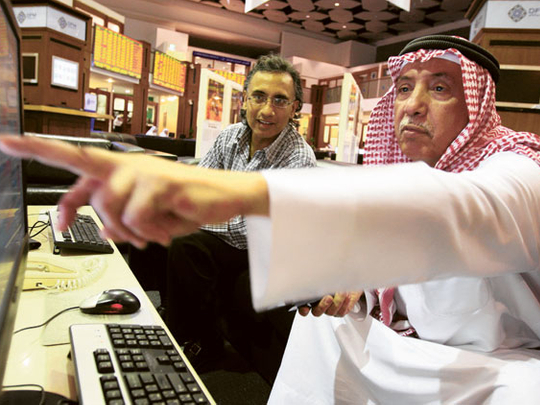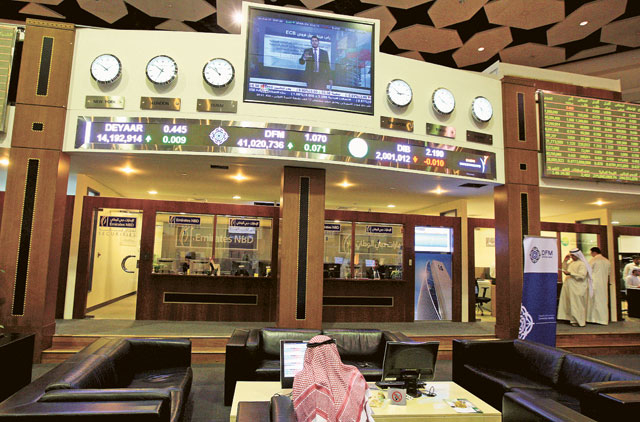
Amid a dearth of local liquidity, the bright lights of Hong Kong are beckoning UAE companies to discover brand new pools of capital in one of the world's fastest growing markets.
The recent bull-run on Dubai's benchmark index has stalled and with the earnings season over, companies and investors have been left to ponder their next move as the global economy continues its arduous return to health.
Hong Kong is hoping to take advantage of this transitional period by targeting local firms with a "strong Asia story to tell" as growth opportunities dwindle in more traditional financial centres.
"We focus on those companies that have an Asian nexus in some form or another, companies that have a significant proportion of their sales or revenues coming either from mainland China or Asia in general," said Eric Landheer, senior vice-president and head of issuer marketing for Hong Kong Exchanges and Clearing Limited.
"Companies in many different sectors could benefit from a Hong Kong listing but really what it comes down to is do they have some kind of Asia story to tell?" he said.
According to Landheer, the Hong Kong Stock Exchange has raised around $122 billion (Dh448.1 billion) in IPO (initial public offering) funds over the last three years — against $75 billion on the New York Stock Exchange and $44 billion on the London Stock Exchange in the same period.
"The economic landscape has definitely changed and there has been a shift from developed markets to companies looking to raise capital in the East and particularly Hong Kong. The valuations are very attractive and there is significant capital available for investment," Landheer said.
"We have seen a lot of companies, particularly in the mining, mineral and natural resources sectors, listing in Hong Kong. But also firms in the consumer goods and luxury sectors," he added.
The issue of liquidity — an asset's ability to be sold without causing a significant movement in price and with minimum loss of value — has long been a concern on the UAE's capital markets scene.
Turnover and trading volumes on both the Dubai Financial Market and the Abu Dhabi Securities Exchange have slumped since the 2008 financial crisis, and foreign institutional investors have largely avoided both indexes in recent years. Retail investors dominate activity but much of the trading is in illiquid stocks.
Depositary receipts
UAE-listed firms seeking to attract new investors through increasing their presence overseas can either list shares on a foreign exchange or utilise an instrument known as depositary receipts, which are securities issued by a depositary that represent the underlying shares of the issuer.
"London and New York depositary receipts are never going to go away. But they are very well established markets so increasingly from a strategic perspective companies are looking at other regions that will give them a source of new liquidity," said Peter Gotke, vice-president of depositary receipts at BNY Mellon.
"The companies best suited to a listing in Hong Kong would be those who have a business that is established or growing in those markets," he added.
Gotke said BNY Mellon has had to initiate most of the conversations with UAE companies about an overseas listing, adding the firm has talked to less than five companies it categorises as a very good fit for Hong Kong. However, he also said dialogue on the issue had changed a lot in the last six months, hinting that local firms were beginning to open up to the idea of seeking capital outside of their home market.
"The depositary receipt instrument is certainly better recognised today than three or four years ago. As we get nearer the end of the financial crisis, people are looking at ways to restructure their companies and raise capital," he said.
BNY Mellon says the centres of liquidity are clearly changing and has termed the concept the "new silk road to Asia Pacific" as investors seek new listing opportunities and methods of raising capital in emerging markets.
But Hong Kong, and the access it provides to mainland China, still faces competition from traditional financial centres, primarily London, with several UAE-listed companies looking to the British capital in recent times.
Last year, DP World became the first Dubai-based company to obtain a premium listing on the London Stock Exchange (LSE). The ports operator, which is also listed on Nasdaq Dubai, listed a series of depositary interests — a different instrument from depositary receipts — on the LSE amid shareholder concern over liquidity levels in the UAE.
The dual listing on Nasdaq and the LSE was done to track a wider range of investors, who are now able to trade the stock across both exchanges. "DP World chose a different instrument — the depositary interest — which is much less prevalent but also means any costs are passed on to the issuer; there is not nearly as much liquidity by doing that. There are some advantages, however, because investors get quoted in ordinary share form," said Gotke.
Earlier this month, NMC Health, an Abu Dhabi-based health care provider, set out its intention to list on the London Stock Exchange as it seeks to raise $250 million (Dh918 million) for new infrastructure projects.
B.R. Shetty, the company's founder, managing director and chief executive officer, told Gulf News the company had chosen London ahead of other centres for its IPO due to its deep pool of capital and global profile, adding it was the most prestigious and the best in terms of regulatory affairs.
"Even though London would be the current favourite, the winds of change and future trends show that Hong Kong and Singapore could become the new flavours especially as trade to the east is growing much faster than trade from the west," said Akbar Naqvi, executive director at Al Masah Capital.
"It is also a question of capital. There is more new capital in the far east right now than Europe and the United States where debt relief is still at the top of the agenda," he added.
Reluctance in listing abroad
Naqvi believes, however, there is still a level of reluctance among UAE companies towards listing abroad, mainly due to concerns over ownership, which he says reflects their stance on local markets.
"For some UAE companies, giving up more than 20-30 per cent ownership tends to be a deal breaker; also previously banks and sovereigns were available to provide the capital requirements without the issue of compromised ownership," he said.
"Listing an IPO also requires putting in place a proper structure with risk, compliance and legal having solid representation; most UAE companies may not necessarily be at that level of sophistication," he added.
The Hong Kong Stock Exchange currently accepts listing applications from 24 jurisdictions of incorporation, the UAE not being one of them at the moment. The fastest way for a company to list on the bourse is if they belong to one of the incorporations Hong Kong accepts, such as Bermuda, Cayman Islands, Cyprus, Jersey or Isle of Man.
"That does not mean we would not look at the UAE as a jurisdiction incorporation; it is just something we have not done yet because we have not had an applicant from the region," said Landheer.
"The valuations are generally very attractive; they are competitive and in many cases superior to what you get in other financial centres. Furthermore, not only do you get access to the same institutional investors that you get in traditional centres like London and New York but you also get the added value of Asian investors — both institutional and retail," he added.
The UAE's IPO pipeline has all but dried up in recent years and many firms still harbour reservations about opening up any further capital to investors. Naqvi said, however, that local companies must seriously consider looking abroad if they want to avoid falling into a "liquidity trap".
"A strong company, with strong fundamentals looking to move to the next step in the growth cycle will always look at options of going public, especially if it has angel/private investors," said Naqvi.
"The question then becomes which type of investor base does it want: an investor base that relates to its geography of business or a more diversified pool which attracts investors looking for new exposure.
"UAE companies listing internationally are primarily looking to increase capital exposure, tap an international investor base and not fall into a liquidity trap in the local markets. If the IPO is successful, it adds a level of sophistication to the image of the company not to mention a diversified investor base that opens up new markets," he added.
Growth story
The Hong Kong Stock Exchange has witnessed a challenging start to 2012 amid fears of an economic slowdown in China.
Investors, however, are keeping faith with equities listed on the benchmark Hang Seng index — the bourse is up more than 13 per cent year-to-date — as valuations remain attractive compared to more established markets.
"It has been a fairly challenging start to 2012 primarily because of the European issues, although some of that is behind us right now; it has also been challenging because of the potential for a slowdown in China in terms of GDP growth," said Eric Landheer, senior vice-president and head of issuer marketing for Hong Kong Exchanges and Clearing Limited. "Overall we are still very positive on the prospects for the remainder of the year. The IPO pipeline still remains extremely strong and we are optimistic we will see additional listings as well as growth in the market," he added.
The Hong Kong Stock Exchange is Asia's third largest bourse in terms of market capitalisation behind the Tokyo Stock Exchange and the Shanghai Stock Exchange.
Several UAE-listed companies are in discussions about a possible dual listing on Hong Kong's bourse as liquidity dries up in Dubai and Abu Dhabi. However, Landheer said that companies interested in opening up to Asian investors would have to conduct a fundraising if they expected to see any significant financial upside.
"What we have seen from some companies, and particularly those that have been listed on other exchanges is that those companies that have done additional listings in conjunction with a capital raise have seen an increase in liquidity in not only their home market but also additional liquidity in Hong Kong," said Landheer.
"It is very important a company does a fundraising if it expects to see additional liquidity or a potential upside in terms of valuation. If they just do a listing by introduction, it is great for branding, visibility and to demonstrate your commitment to Asia. But it does not necessarily mean an upside in terms of liquidity or valuations," he added.












